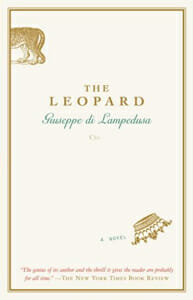Giuseppe Di Lampedusa

You say you want a revolution?
I am often drawn to a novel by the story behind the story: Proust writing night after night in a cork-lined room like a literary Dracula; Henry Roth chipping away at four decades of writer’s block to create the best book of the 1990s; Bolaño refusing hospitalization in hopes of finishing his masterpiece. I feel these acts of artistic heroism should not go unrewarded. Authors who dip their quill in a mixture of blood, sweat and tears deserve to be read.
-

-

-

-

-

-

-

-

-

-

-

-

-

-

-

-

-

-

-

-

-

-

-

-

-

-

-

-

-

-

-

-

-

-

-

-

-

-

-

-








































